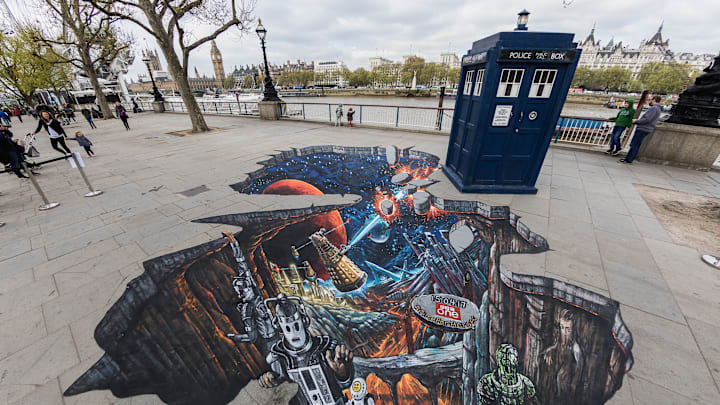2003: Series revived

Lorraine Heggessey, the new BBC 1 Controller, was vocal about wanting to see Doctor Who return. After several rejected proposals and uncertain approaches, an announcement came on September 26, 2003—less than a month before the series's 40th anniversary—that a revival was in the works.
Though the new production would accept the previous continuity, it would begin with "series 1," marking a new era in the world of Doctor Who. The series would be run by Russell T. Davies, along with several talented writers and fans.

Christopher Eccleston Year (2005)
The revival eliminated the serial-style episodes, instead favoring distinct 45-minute episodes. Before it even aired, there was a lot of controversy over whether or not this new series would live up to its predecessor. Nobody seemed to trust that the beloved show could be honored by its new stars: Christopher Eccleston and pop star Billie Piper.
However, the controversy quickly died down after the show aired. On March 26, 2005, the episode "Rose" was released. Audiences quickly latched onto the charismatic companion, and Christopher Eccleston proved that he had the gravitas to handle his role.
However, Davies made some major changes to the series's lore. The biggest of these was the elimination of Gallifrey and its people, who had been complicated parts of the classic era. Now, the Doctor was the last of his kind, truly an alien with nobody to truly connect with.
The show was a hit, but it was about to face its first major shake-up. Christopher Eccleston quit the show.
It would be years before Eccleston fully explained his departure. According to an interview with Radio Times from 2018:
"My relationship with my three immediate superiors – the showrunner, the producer and co-producer – broke down irreparably during the first block of filming and it never recovered. They lost trust in me, and I lost faith and trust and belief in them."Christopher Eccleston

David Tennant Years (2005-2010)
Replacing Eccleston was David Tennant, a Doctor Who superfan who had previously worked with Davies on Casanova. Tennant's version of the character brought in many younger fans and international fans, bringing the series to new heights.
Rather than the unexpected shifts in cast that had happened during the classic era, companions now had entire seasons focused on themselves. David Tennant's Doctor maintained a romantic relationship with Billie Piper's Rose throughout the second series. Series 3 starred Freema Agyeman as Martha Jones and Series 4 focused on Catherine Tate's Donna Noble, who had been introduced in the 2006 Christmas special.
While Tennant's Doctor was more of an action hero with romantic potential than the enigmatic figure from Classic Who, his tenure did include the return of several popular villains, including the Master (now played by John Simm). Alongside traditional monsters, series 3 introduced the Weeping Angels, which are perhaps the most iconic villains to come from the revival.
Spin-offs Galore
With Russell T. Davies as showrunner, Doctor Who spawned several other shows.
- Doctor Who Confidential (2005-2011) included behind-the-scenes footage to help audiences connect with the actors and feel like they were part of the show's production.
- Torchwood (2006-2011) featured an Earth-bound team that stopped alien threats. This was viewed as a place for adults who loved the world of Doctor Who, as there was a considerable amount of sex and violence.
- Totally Doctor Who (2006-2007) was a children's program primarily consisting of behind-the-scenes footage and interactions with the fandom.
- The Sarah Jane Adventures (2007-2011) followed Sarah Jane Smith, her adopted son, and his friends as they investigated alien threats. This was a children's show, considered tame enough for children as young as 6 years old.
- The Infinite Quest (2007) was an animated serial starring David Tennant's Tenth Doctor and Freema Agyeman's Martha Jones.
